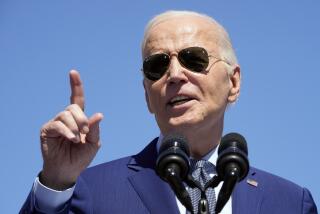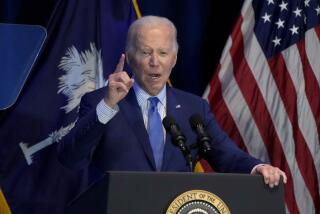Popularity of Bush Plummets to 55% in Poll
- Share via
WASHINGTON — As Congress and the Administration have struggled to reach an agreement on the budget, President Bush’s popularity has tumbled to its lowest point since the earliest months of his presidency, as measured by a Times Mirror poll, which was made public Monday.
The poll, conducted over a four-day period that ended Sunday, found that 55% of those surveyed approve of the way Bush is handling his job, and 28% disapprove.
The job rating, although respectable by historical standards, nevertheless marked a significant drop over the last two months.
Bush’s popularity had shot up to 76% in early August--and remained high, at 68%, in September--in the wake of Iraq’s invasion of Kuwait and the massive deployment of U.S. troops to the Persian Gulf.
But the nationwide poll, done for The Times Mirror Center for The People & The Press by Princeton Survey Research Associates, indicated that this surge has largely dissipated and that Bush’s popularity has fallen back to what poll-takers and political consultants consider potentially troublesome levels at a time of renewed public worries about the economy.
Times Mirror Co. is the owner of the Los Angeles Times and other newspaper, broadcasting and publishing enterprises.
The drop in Bush’s popularity occurs in the midst of what appears to be growing dissatisfaction with political insiders across the country--as reflected by votes this autumn in Massachusetts, Oklahoma and Louisiana--and could spell difficult times ahead for the President, whose ties to Washington go back nearly 25 years.
“Now the test comes,” said Stuart Spencer, the California political consultant who was a close adviser to Ronald Reagan during his presidency.
The survey was conducted between Thursday and Sunday--a period that followed Bush’s televised speech to the nation in which he urged support for the budget compromise worked out by congressional leaders and Administration officials.
The survey covered the period when Congress rejected the budget plan on Friday and when the government closed down all non-essential operations over the weekend.
The poll found that, despite the attention given in Congress to the impact that the now-discarded budget plan would have had on Medicare--by increasing costs for beneficiaries--only 11% of those polled were aware that Medicare fees would have been raised.
By contrast, 45% were aware that the plan entailed higher gasoline taxes, 40% knew that it involved higher taxes on alcohol and 38% were aware that it would have imposed higher taxes on cigarettes.
Thus, although much of the opposition in the congressional debate dealt--as a result of a concentrated letter-writing and telephone campaign--with the impact on the elderly, many more people were aware of the impact that the budget cuts would have had on other groups.
With the budget crisis dominating news from Washington over an otherwise quiet Columbus Day holiday, the White House aggressively tried to portray Congress as the cause for the impasse, and congressional leaders took aim at the White House.
But there was at least anecdotal evidence that, outside of Washington, citizens viewed both power centers as worthy of blame.
“The blame starts at the top--people at the top should be able to plan ahead for this and they didn’t,” said Patrick Campbell, the 39-year-old doorman at the Sheraton Hotel in downtown Baltimore.
“When I say people at the top, I think both the Congress and the President are at fault,” he said.
But, in the past, frustration with Congress as an institution has not necessarily spelled difficulty for individual incumbents seeking reelection.
Rather, said Steven Smith, a professor of political science at the University of Minnesota who studies Congress and the presidency, “any bad news about how the government is conducting its affairs rubs off on the President.”
“Normally, a President has an increasingly difficult time getting what he wants out of Congress, and Bush is discovering that,” Smith said. “He, more than other presidents, has put off difficult choices until the end” of the congressional session.
Rather than dive into controversy, Smith said, Bush “chose to be popular.”
Now, he concluded, Bush is being forced to make unpopular choices, “and it will cost him dearly and probably more than we’ve seen in the polls so far.”
The poll report was greeted with cheers by Paul Maslin, a Democratic pollster, who said that “Bush had this high-wire act going on, where basically the country did not feel good about itself and did not feel good about the economy, and yet Bush’s popularity has remained high. It couldn’t last forever.”
The overall job approval rating was Bush’s lowest in 1990, as measured by Times Mirror polls.
It came close to the lowest ratings of his presidency--51% during the first month of his White House tenure, January, 1989, and only a few percentage points higher in the subsequent months before the political upheavals in Eastern Europe.
A separate poll conducted by ABC News and the Washington Post, also showed that Bush’s popularity has suffered as a result of the budget crisis. In that survey, the President’s popularity rating fell to 65%, down from 75% a month ago.
The ABC/Post poll said that a solid majority of Americans--six of 10--now say that they disapprove of Bush’s and Congress’ handling of the budget deficit. That is a 14-point increase since late September.
According to the Times Mirror survey, greater dissatisfaction with the way Bush is handling his job was registered by all demographic and political groups. But his approval ratings declined by 15 percentage points or more among older people, who registered a 47% approval rating; blacks, at 32% approval; and Democrats, at 40%.
Spencer pointed out that the 28% disapproval rating remained low. The popularity drop, he said, was simply getting Bush “back to reality” after the “abnormally high” popularity figures earlier in the year.
Before Iraq invaded Kuwait on Aug. 2--creating the sort of foreign policy crisis that has historically generated an initial display of support for a U.S. President--Bush’s ratings had dropped from 74% in April to 64% in July.
Without the boost Bush received from Iraq, said Times political consultant William Schneider, his rating might be below 50%. “When a President drops below 50%, he’s in trouble,” Schneider said.
The survey measured the opinions of 1,213 adults. For results based on the total sample, one can say with 95% confidence that the error attributable to sampling and other random effects is plus or minus 3 percentage points.
Staff writer James Risen in Baltimore contributed to this article.
More to Read
Get the L.A. Times Politics newsletter
Deeply reported insights into legislation, politics and policy from Sacramento, Washington and beyond. In your inbox twice per week.
You may occasionally receive promotional content from the Los Angeles Times.











